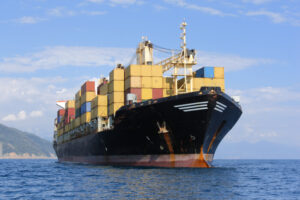
Ukrainian companies increased exports of ferrous scrap by 62.4% year-on-year in January-November this year, up to 261,578 thousand tons from 161,025 thousand tons.
According to the statistics released by the State Customs Service on Monday, 34.608 thousand tons of scrap were exported in November, 24.549 thousand tons in October, 24.767 thousand tons in September, and 28.767 thousand tons in August. tons, in August – 28,425 thousand tons, in July – 24,702 thousand tons, in June – 22,161 thousand tons, in May – 14,952 thousand tons, in April – 26,153 thousand tons, in March – 20,907 thousand tons, in February – 23,194 thousand tons, in January – 17,160 thousand tons.
In monetary terms, scrap exports increased by 76.8% to $82.056 million from $46.406 million.
In January-November, Ukraine exported scrap mainly to Poland (82.56%), Greece (12.58%) and Germany (3.49%).
For the eleven months of the year, the country imported 100 tons of scrap metal for $108 thousand, while in January-November 2023, 987 tons were imported for $383 thousand. This year’s imports were carried out mainly from Turkey (65.74% in monetary terms), the British Virgin Islands (16.67%) and Panama (6.48%).
As reported, in 2023, Ukraine’s scrap collecting enterprise increased scrap exports from the country by 3.4 times compared to the previous year – up to 182,485 thousand tons from 53,557 thousand tons. In monetary terms, exports increased 2.74 times to $52.723 million from $19.271 million.
Earlier, Ukrmetallurgprom President Oleksandr Kalenkov stated in a column on the Interfax-Ukraine website that scrap is exported through the European Union, which has a preferential export duty of EUR3 per ton, and from there the raw materials are redirected to real customers. He noted that exporting raw materials directly to customers would cost EUR180 in export duties, and the Ukrainian budget has already lost UAH 350 million.
The head of Ukrmetallurgprom called for a temporary ban on the export of ferrous scrap to provide steelmakers with strategically important raw materials in the face of the ongoing war. He also clarified that a ton of scrap processed into steel brings in 10 times more to the budget than the EU export duty, which is about $300 per ton.
In 2022, Ukraine reduced exports of ferrous scrap by 11.5 times compared to the previous year, to 53,557 thousand tons, and in monetary terms, it decreased by 12.4 times, to $19.271 million.

Imports of tractors to Ukraine in January-November this year amounted to $722.53 million, which is almost 7% less than in the same period in 2023, according to statistics from the State Customs Service.
According to the statistics released by the agency, tractors were mainly imported from Germany (15.2% of total imports of this equipment, or $110 million), China (13.9%, or $100 million) and the United States (13.5%, or $97.3 million), while a year earlier it was Germany (17%), Poland (almost 16%) and the Netherlands (13%).
At the same time, in November, Ukraine imported tractors worth $61.9 million, up 33.6% compared to the same month last year.
According to the statistics, in January-November, tractors worth almost $5 million were exported, compared to $5.47 a year earlier, mainly to Moldova (25.8%), Kazakhstan (14.8%) and the Czech Republic (11.8%).

In January-November 2024, 73.4 million tons of cargo were exported through the Ukrainian Sea Corridor, Deputy Minister of Community Development, Territories and Infrastructure Timur Tkachenko said on Facebook on Wednesday.
According to him, the volume of exports since the start of the sea corridor in September 2023 has reached 85 million tons.
In addition, the total volume of cargo handled in Ukrainian ports in January-November reached 91.1 million tons, compared to 52.8 million tons in the same period in 2023.
Grain crops remain the leaders in terms of transshipment volumes: 56.1 million tons were handled in 11 months, which is significantly higher than last year’s figure of 39.4 million tons. The volume of ore cargo increased to 16.7 million tons, up from 3.2 million tons in 2023.
In November, Ukraine’s seaports handled 7.6 million tons of cargo, up from 6.7 million tons last year.
“Ukrainian seaports remain key points in international logistics, proving their ability to adapt to challenges and ensure stability even in the most difficult conditions,” Tkachenko wrote, noting that thanks to well-coordinated work, international support and the Armed Forces of Ukraine, Ukraine continues to maintain its position in the global transportation market and confirm its status as a reliable partner.
Earlier, the Ukrainian Sea Ports Authority reported that the cargo turnover of Ukrainian ports from January 1 to November 17, 2024 increased to 86.8 million tons, of which 53.5 million tons were grain cargo.
In addition, it was reported that during the first year of operation of the Ukrainian Sea Corridor, 64.4 million tons of cargo were transported, including 43.5 million tons of grain. During this period, 2379 vessels used the corridor, exporting products to 46 countries.

In January-November this year, Ukraine increased exports of semi-finished carbon steel products in physical terms by 59.7% year-on-year to 1 million 763,843 tons.
According to statistics released by the State Customs Service (SCS) on Monday, exports of carbon steel semi-finished products increased by 54.8% to $870.356 million in monetary terms.
The main exports were made to Bulgaria (31.47% of supplies in monetary terms), Egypt (19.21%) and Turkey (11.31%).
In January-November 2024, Ukraine imported 15 tons of semi-finished products worth $33 thousand from Romania (60.61%), Poland (24.24%) and Egypt (15.15%), while in January-November 2023 it imported 96 tons worth $172 thousand.
As reported, in 2023, Ukraine decreased exports of carbon steel semi-finished products in physical terms by 36.7% compared to 2022 – to 1 million 203.454 thousand tons, while exports in monetary terms decreased by 48.9% to $608.516 million. The main exports were made to Bulgaria (36.66% of supplies in monetary terms), Poland (23.01%), and Italy (9.60%).
In addition, in 2023, Ukraine imported 96 tons of semi-finished products from China (98.26%) and Turkey (1.74%) for $172 thousand.

In January-November this year, Ukraine reduced exports of titanium ores and concentrate in physical terms by 42.2% compared to the same period last year, to 6,394 thousand tons.
According to statistics released by the State Customs Service (SCS) on Monday, exports of titanium ore and concentrate in monetary terms decreased by 44.1% to $10.328 million.
The main exports were to Turkey (62.01% of supplies in monetary terms), Poland (7.82%) and Egypt (6.83%).
At the same time, experts point out that the statistics on titanium ore exports are inconsistent. In particular, at the request of Interfax-Ukraine, Velta Production and Commercial Firm (PCF) LLC with titanium ore mining assets in Novomyrhorod (Kirovohrad region) reported that in January-February 2024 alone, the company exported more than 15 thousand tons of ilmenite (titanium concentrate) to the Czech Republic and Mexico. At the same time, experts believe that the GTS provides data only on the supply of rutile (also titanium ore).
In eleven months of 2024, Ukraine imported 231 tons of titanium ore worth $363 thousand from China (91.74%) and Senegal (8.26%).
As reported, in 2023, Ukraine reduced exports of titanium ore in physical terms by 96.4% compared to 2022 – to 11,648 thousand tons, and revenue by 85.1% – to $19.426 million. At the same time, the main exports were made to Turkey (38.21% of supplies in monetary terms), Japan (16.53%) and India (6.12%).
Last year, the country imported a ton of such ore from the Netherlands for $2 thousand.
In Ukraine, titanium ore is currently mined mainly by the United Mining and Chemical Company (UMCC), which has been given control of Vilnohirsk Mining and Metallurgical Plant (VGMK, Dnipro region) and Irshansk Mining and Metallurgical Plant (Irshansk, Dnipro region). ) and Irshansk Mining and Processing Plant (IGOK, Zhytomyr region), as well as Mezhirichinsky GOK and Valky Ilmenite (both based in Irshansk, Zhytomyr region). In addition, Velta (Dnipro) has built a mining and processing plant at the Byrzulivske deposit with a capacity of 240 thousand tons of ilmenite concentrate per year.

In January-November this year, Ukrainian mining companies increased exports of iron ore by 87.4% in physical terms compared to the same period last year, to 30 million 250,394 thousand tons.
According to the statistics released by the State Customs Service on Monday, foreign exchange earnings from iron ore exports increased by 55.8% to $2 billion 530.162 million during this period.
Exports of iron ore were carried out mainly to China (34.61% of supplies in monetary terms), Poland (17.68%) and Slovakia (17.07%).
In January-November 2024, Ukraine imported iron ore for $409 thousand in a total volume of 2.031 thousand tons, while in January-November 2023, 244 tons of this raw material were imported for $131 thousand. This year, imports were carried out from Poland (50.37%), the Netherlands (23.23%) and Norway (13.69%).
As reported, in 2023, Ukraine decreased exports of iron ore in physical terms by 26% compared to 2022 – to 17 million 753.165 thousand tons, foreign exchange earnings from iron ore exports amounted to $1 billion 766.906 million (down 39.3%). Iron ore was exported mainly to Slovakia (28.39% of supplies in monetary terms), the Czech Republic (19.74%) and Poland (19.56%).
Last year, Ukraine imported iron ore worth $135 thousand in the total amount of 250 tons. During this period, imports were made from Norway (34.81%), Italy (28.89%) and the Netherlands (28.89%). While in 2022, iron ore was imported for $65 thousand in a total volume of 101 tons.